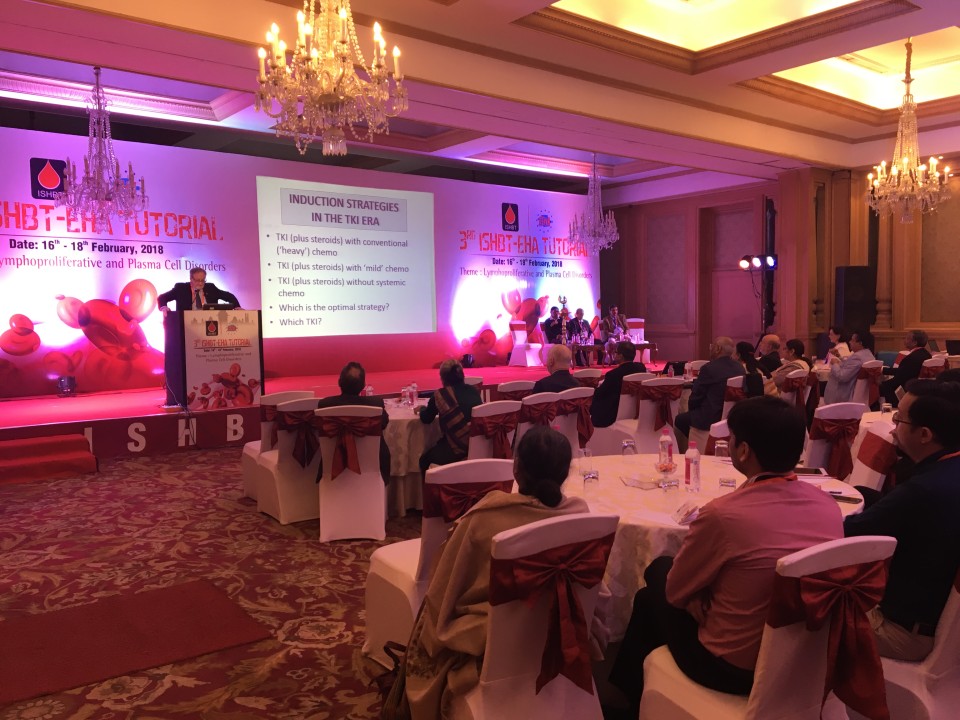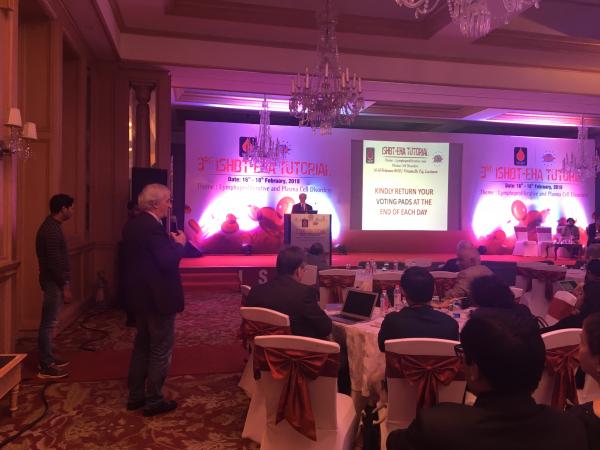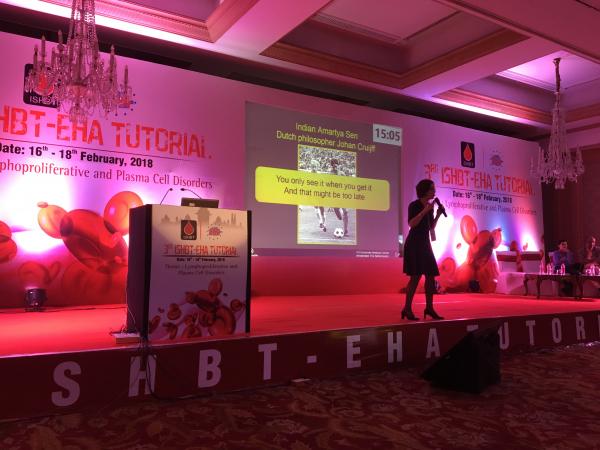This information originally appeared on the previous EHA website. Links to other pages may be inactive.

The 3rd EHA-ISHBT Hematology Tutorial on Lymphoproliferative and Plasma Cell Disorders was held on February 16-18 in Lucknow, India, and chaired by Dr AK Tripathi (King George’s Medical University, Lucknow, India) and Prof G Gaidano (University of Eastern Piedmont, Novara, Italy).
“Incredible India not only accounts for the landscape, the architecture and the culture, meeting with dedicated hematologists from India, Sri Lanka and Nepal was a wonderful experience. Lively discussions following lectures and real life patient cases generated knowledge on the diagnosis and treatment of multiple myeloma and lymphoma. Getting to know each other’s work but also each other was not only fruitful but also enjoyable” - Prof Sonja Zweegman, VUmc, Amsterdam, The Netherlands
EHA has a long-standing collaboration and scientific relationship with the Indian Society of Hematology and Blood Transfusion. This includes annual joint symposia and various hematology tutorials, such as this one. Previous successful editions were organized in Kolkata (2014) and Mumbai (2016).
The focus of this three-day tutorial was on lymphoproliferative and plasma cell disorders. It addressed the needs of both laboratory and clinical hematologists by providing an integrated diagnostic and clinical work-up of lymphoid disorders. The program covered the current therapeutic options with “old” and “new” drugs from the perspective of personalized medicine and tailored treatment for all those who are in clinical need.
The diagnostic and therapeutic paradigm of lymphoproliferative and plasma cell disorders have changed deeply during the last few years. The new scientific and clinical knowledge that has been acquired offers many opportunities for improving the outcome of our patients, but also poses new challenges that clinicians need to address. In this new era of lymphoid malignancies, the tutorial aimed at being a scientific and educational forum where all attendees and faculty could share ideas, thoughts and critical views on how to implement new knowledge in clinical practice for the best of hematological patients.
This tutorial was organized for clinical hematologists, hemato-pathologists and fellows/post graduate residents in hematology from India and other South Asian countries. The tutorial attracted 238 delegates from all over India, Bangladesh, Nepal and Sri Lanka.
The main reason to attend the meeting for most of the attendees were the topics and faculty. One of the main objectives of attendees was to attend lectures / hear updates, meet experts and/or present an e-poster. Where objectives are concerned, respondents gave the tutorial a score of 1.75 out of 5 (with 1 being the highest).

Prof Niels van de Donk stated that “the tutorial enabled the audience to talk to the speakers during breaks/dinner about differences in therapy of hematological malignancies between the different countries. This was not only valuable for the audience but also for me as speaker”.
The following topics were covered in the program:
- Adult and pediatric acute lymphoblastic leukemia
- Chronic lymphocytic leukemia
- Low grade B-cell lymphoma
- High grade lymphomas
- Hodgkin lymphoma
- Lymphoma in immuno-compromised patients
- Multiple myeloma and other plasma cell disorders (Waldenström, PCL)
- Transplantation in lymphoid malignancies
It was “a very well-attended tutorial, with sessions followed with interest and with active interaction with the speakers”, said Prof Josep-Maria Ribera, ICO-Hospital Germans Trias i Pujo, Badalona, Spain.
The program consisted of lectures and clinical cases by the international faculty, and self-assessment cases by the national faculty from India.

48 abstracts were selected to be presented as e-posters. The best 3 abstracts were awarded with a prize at the closing ceremony of the tutorial.
50 delegates from India, Bangladesh, Nepal and Sri Lanka to attended the tutorial with the help of scholarships. One of the awardees was quoted as saying, “Scholarship program was much appreciated as it gave many of us the possibility to attend the program”.
Overall, the meeting was found stimulating (1.49 out of 5), relevant to the attendees’ work (1.57 out of 5), and challenging (2.03 out of 5).
Respondents of the delegate survey gave the meeting an overall rating of 8.67 out of 10. 97.44% would recommend the meeting to a friend or colleague, and 89.74% indicated to attend the next tutorial.
EHA would like to thank ISHBT, the chairs, the faculty, the scientific program committee, and sponsors for their invaluable contribution to this excellent meeting.